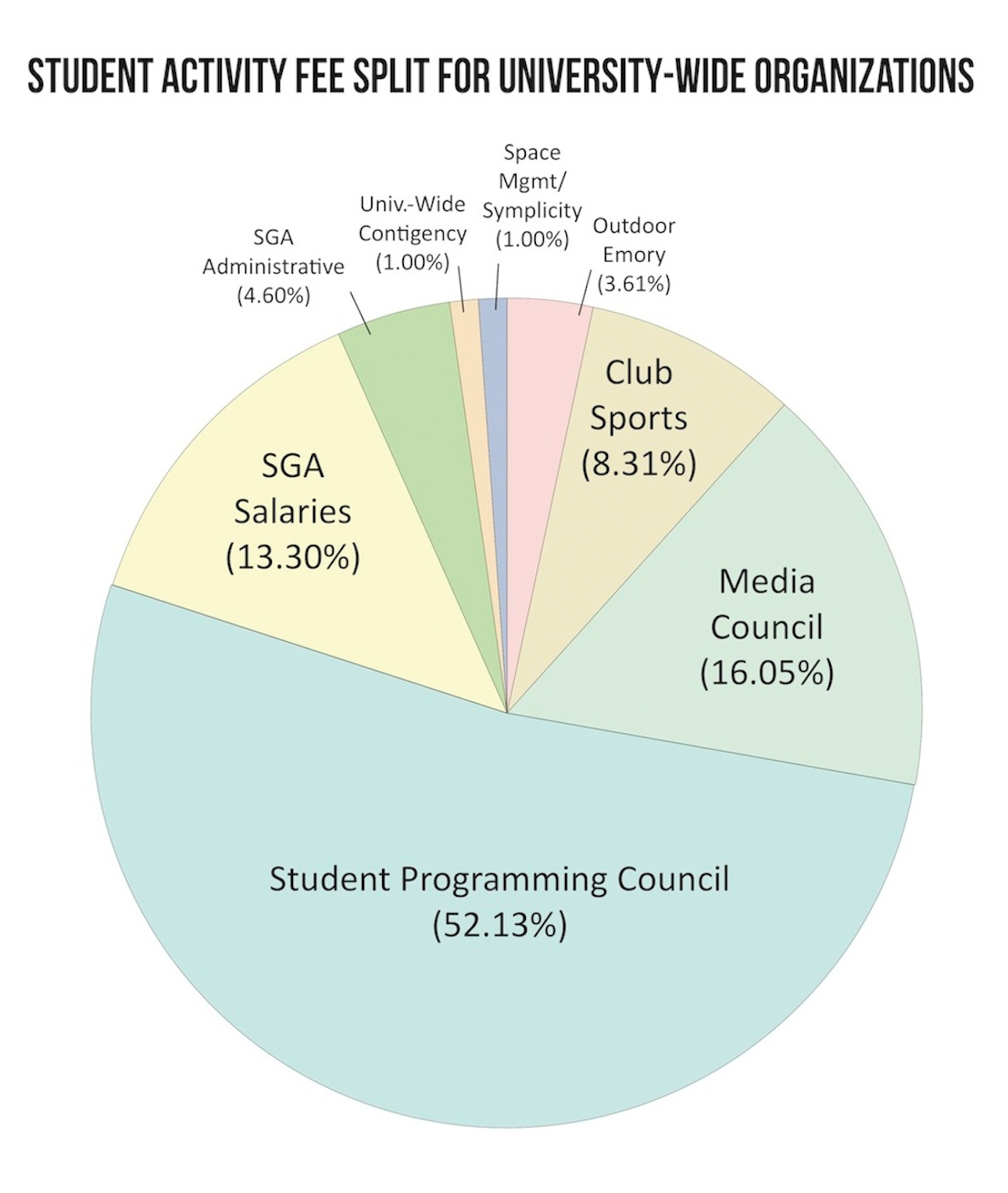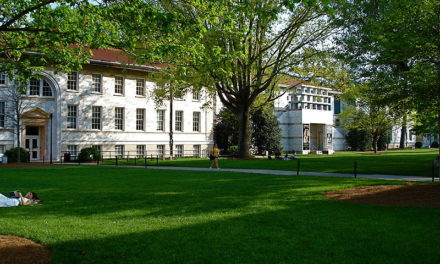Due to an accounting error, the Student Government Association (SGA) unintentionally overfunded all four University-wide organizations – the Student Programming Council (SPC), Media Council, Outdoor Emory Organization and Club Sports – as well as its own administrative and Business Office staff salary accounts for two years by a total of about $212,000, student government leaders said last week.
Each of the University-wide organizations either partially or fully repaid SGA this semester, following agreements they made with SGA last spring soon after the error was discovered. The extra money allocated into SGA’s salary and administrative accounts was also repaid, said Meredith Honeycutt, SGA business manager.
The money that SGA allocates to different accounts – including those affected by the error – comes from the $89 that all undergraduate and graduate students pay as part of their tuition each semester.
According to Wheel interviews with SGA officials and an SGA statement released to students via email last Thursday, the accounting error occurred about two years ago, when SGA started using PeopleSoft Compass, software that allows SGA to manage its finances.
A certain financial process that had been completed automatically with the previous software had to be done manually with Compass, Honeycutt said. When staff in the SGA Business Office began manually inputting the information, an incorrect account code was entered into the system.
As a result, for the next two years, money that was supposed to remain in SGA’s University-wide contingency account – which is used for SGA-sponsored events and supplemental funding for student clubs – was dispersed to each University-wide organization, as well as SGA’s accounts for its administrative budget and SGA Business Office salaries, said College senior Calvin Lee, SGA vice president for finance.
Therefore, these parties received more money than they were supposed to under the Student Activity Fee split, which is used to distribute the students’ $89.
Under the current fee split, SGA allocates fixed percentages of funds to the University-wide organizations; 12 divisional councils, which represent specific Emory schools and include organizations such as College Council and BBA Council; and other stakeholders.
The divisional councils were not affected by the error, according to the SGA statement, sent on behalf of Jon Darby, vice president for communications and College sophomore, and Lee.
Last week, the Wheel reported that many members of SGA, including Darby, have said a bill that SGA recently passed regarding the fee split was not a result of the error.
The legislation, which could become effective as early as next fall, will allow SGA to fund the University-wide organizations on an as-needed basis rather than providing them with a fixed percentage of money from the fee split each semester, and will also create a new data entry specialist position in the SGA Business Office. The timing of the vote on the bill, SGA leaders say, was merely coincidental.
Eric Bymaster, the Division of Campus Life’s assistant vice president for finance and operations, and Honeycutt discovered the error early in the spring semester when they were conducting a review of SGA account balances, Bymaster wrote in an email to the Wheel.
Soon after this discovery, SGA and University-wide organization leaders made agreements requiring the organizations to repay the money to SGA, according to the SGA statement.
“If a bank automatically deposited funds into your checking account and then caught the error, you would be expected to give the funds back immediately,” Honeycutt wrote in an email to the Wheel. “This situation is no different. Compass is a complex system, and with any new system there is a learning curve. This was an unfortunate error during that learning process.”
 This semester, Media Council, Outdoor Emory Organization and Club Sports transferred the necessary funds back to SGA. SPC has three years to make the complete transfer because it receives more money than the other organizations from the fee split.
This semester, Media Council, Outdoor Emory Organization and Club Sports transferred the necessary funds back to SGA. SPC has three years to make the complete transfer because it receives more money than the other organizations from the fee split.
Media Council, Club Sports and Outdoor Emory Organization have repaid SGA about $34,000, $17,000 and $7,400, respectively. SPC has repaid about $21,900 and must repay a total of about $109,000.
The error has affected these organizations differently. The financial impact on SPC has been minimal, and Club Sports has been able to manage despite receiving less funding than in the past, the organizations’ treasurers say. B-School junior and Treasurer of Outdoor Emory Organization Alex Ting, who specified that he was not treasurer at the time the error was discussed, said Outdoor Emory did not have to consult SGA about any financial issues this semester.
But Media Council President and College senior Max Farina said repaying SGA has left the organization in debt. For example, Farina said Media Council has been unable to bring in guest speakers and could not provide funding for a new Emory publication, The Sino-Emory Newsletter, which is the first English-Chinese bilingual student newsletter in Atlanta.
The Error
Bymaster wrote in an email to the Wheel that the error was “a miscommunication” between the Controller’s Office in the University’s Finance Division – which is responsible for financial reporting, operations and services – and himself and Honeycutt.
Before the new software was implemented, any unspent money in the University-wide contingency fund would automatically roll over to the next year, Bymaster wrote. But that automatic rollover stopped when Emory converted to the Compass system. Honeycutt wrote in an email that she and Bymaster were not aware about this change at first.
“When it didn’t roll, I questioned it and was told it had to be done manually,” Honeycutt wrote.
Because of the complexity of the new system, Honeycutt wrote, an incorrect account code was entered into the system.
Due to the error, funds that should have “rolled over” in the contingency account went to the University-wide organizations, the SGA salaries account and the SGA administrative account, according to the SGA statement.
Bymaster and Honeycutt noticed the error when reviewing SGA finances in January and February. After they saw some “higher than expected” balances, Bymaster explained, the SGA business manager reviewed detailed transactions to find the source of the issue.
“Once we discovered the issue, we made the adjustments and began rolling up the funds manually at year-end,” Bymaster wrote.
When Bymaster and Honeycutt recognized the error last spring, the SGA Business Office contacted the affected organizations to develop a plan to repay the funds to SGA, according to the SGA statement. SGA and leadership of the University-wide organizations agreed to repayment plans in March 2013.
Repayments were determined based on the size of the organizations’ budgets and “the ability of the organization to repay SGA without a significant impact on programming or operation,” the SGA statement says.
SPC receives 52.13 percent of the money in SGA’s University-wide fund, whereas Club Sports receives 8.31 percent; Media Council, 16.05 percent; and Outdoor Emory Organization, 3.61 percent. Due to the larger sum SPC owes SGA, SPC entered a three-year repayment agreement, whereas the others were granted a year to repay SGA.
“They were given a multi-year plan because if all of that money had to be recuperated at one time it would have a detrimental impact on their ability to program and create a positive Emory experience,” Darby told the Wheel.
However, Farina, the Media Council president, said that when he met with SGA leaders in the spring, he was told that Media Council would have several years to pay back SGA “in order to avoid hardship caused by a sudden depletion of funds.” He said he was surprised in the fall to hear that Media Council would have to pay back all of the funds at one time, adding that this has negatively impacted his organization’s ability to provide funding to student publications.
But SGA leaders say this was not the case. Lee said SPC was given an option to pay back SGA in either three or five years, but he and Honeycutt both said a multi-year repayment plan for Media Council was not discussed.
Effects on Organizations
The error has had mixed impacts on organizations. Farina said Media Council has been affected negatively, while other leaders say they have not been hurt to as great of an extent.
The transfer of Media Council money back to SGA this semester, Farina said, has left Media Council in a “bleak” situation. He said it has caused a significant debt that has forced Media Council to take money from its own executive account to ensure that the different media publications that fall under it receive enough funding to operate.
As per typical Media Council policy, Media Council chose to wait to observe the quality of The Sino-Emory Newsletter before deciding whether to fund it.
“Unfortunately, SGA’s withdrawal of the funds from our contingency account not only prevents us from funding further issues of this landmark publication but [also] leaves us unable to compensate the publication’s executive board for a large portion of their costs which they paid personally,” Farina said.
Media Council also asked SGA for a loan this semester, Farina said. However, because the loan would have come from SGA’s University-wide contingency account, which receives only 1 percent of money from the fee split and is used to help fund other groups’ events, SGA was unable to grant that request, Lee said.
Meanwhile, because SPC is paying back SGA in the course of three years, the error is “not hindering us in any way,” said Goizueta Business School junior and SPC Treasurer Michael Nathin, because the money SPC is losing every year is less than 5 percent of its annual budget.
“It’s an unfortunate situation, but it’s really not having a severe impact on our planning and our results,” Nathin said.
College senior and Club Sports Treasurer Christian Bray said that while Club Sports received less money to allocate to teams this year, he hopes this will not be the case in the future.
“Next year, we would like to see Club Sports get about the same amount that we received two years ago before the accounting error,” Bray said.
News Co-Editors Dustin Slade and Karishma Mehrotra and Assistant News Editor Rupsha Basu contributed reporting.
– By Jordan Friedman
Updated Thursday, Jan. 16 to match the version of the story published in print.
The Emory Wheel was founded in 1919 and is currently the only independent, student-run newspaper of Emory University. The Wheel publishes weekly on Wednesdays during the academic year, except during University holidays and scheduled publication intermissions.
The Wheel is financially and editorially independent from the University. All of its content is generated by the Wheel’s more than 100 student staff members and contributing writers, and its printing costs are covered by profits from self-generated advertising sales.







